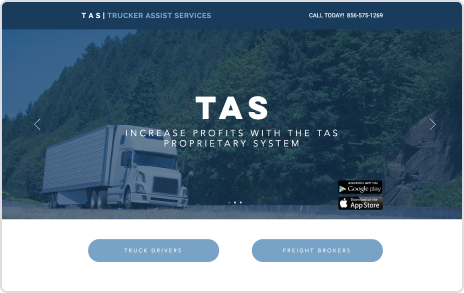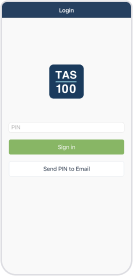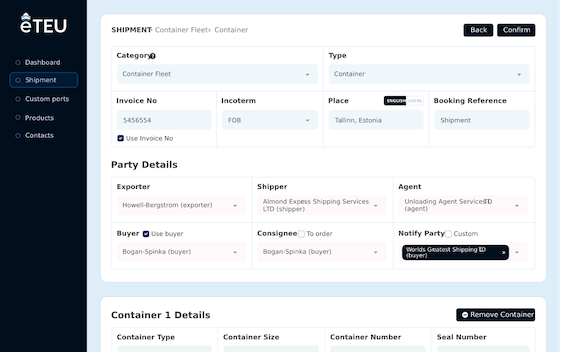Move your business to the top tier in asset management. Acquire an asset tracking system (SAM) through custom AI software development and benefit from continuous improvement in your supply chain, transportation, and logistics operations.
Consulting
We can consult on constructing a practical and beneficial technical solution for your product.
Custom software
We deliver highly specialized, cutting-edge solutions for all niches of the logistics industry.
Dedicated teams
Jumpstart your long-term projects with a team of hand-picked professionals powered by AI.
Services
Technologies
- Adexin
- Services
- Custom software
- Asset tracking software development
AI-based asset tracking software development
Where we can help
We are here to provide your company with the best AI-driven SAM tools designed directly for your unique transportation, logistics, and supply chain operations. Get rid of data management limitations and get a realistic view with the advanced technology available for your business today.
Storage of asset data
This two-tier AI-enabled SAM software feature enables efficient storage and intelligent management of asset-related data. This includes physical location, usage history, and predictive maintenance insights. Enabling effective inventory control with machine learning models to optimize inventory levels and reduce carrying costs.
Equipment tracking system
Provide functionality for AI-based tracking internal warehouse equipment such as electric pallet trucks (EPTs), tools, machinery, and racks. You can implement a comprehensive tracking system to increase visibility and control over valuable assets. Consider developing custom software to tailor the tracking system to your specific business needs and requirements.
Analyze and report on asset tracking
Take advantage of custom AI software features to enhance analytical and predictive capabilities based on your unique business processes. You will be able to use advanced AI tools for historical data management, visual analytics, key performance indicators (KPIs), and automated reporting. Gain valuable insight into resource utilization, helping you make data-driven decisions.
Real-time asset monitoring
Get started with our AI-enhanced real-time monitoring software tailored to your company's dynamic needs. Get predictive, real-time tracking of trailers, trucks, containers, and warehouse facilities. Utilize AI-powered location mapping to continuously monitor assets and ensure a quick automated response to any anomalies or problems.
Mobile asset tracking
Together with custom AI features, you can create a mobile tracking solution that adapts intelligently to your organization’s workflow. Use AI-enabled mobile devices and apps to track assets in real time. Allowing field workers to access and update data via mobile apps provides flexibility, automation, and accurate data capture.
RFID asset tracking system
Implement the AI-enhanced features of our software to seamlessly integrate RFID tracking into your existing management system. Combine RFID technology with AI-driven barcode and QR code recognition for asset tracking. Use built-in smart sensors and BLE, UWB, and NFC technologies to enhance intelligent detection and data accuracy.
GPS asset tracking
Start with our AI system function development services to ensure seamless integration and optimal performance. Apply AI-based GPS asset tracking to achieve real-time location awareness and route prediction. Use machine learning models for precise monitoring of asset movement. Integrate GPS tracking with AI analytics for comprehensive operational visibility.
Maintenance tracking
Get a best-in-class AI software feature to enable augmented reality and predictive maintenance tracking. Track scheduled and AI-predicted maintenance activities for assets. Deploy computer vision, machine learning, and IoT technologies to enhance tracking accuracy, increase maintenance efficiency, and reduce downtime.
Integration
Take advantage of AI integration capabilities with our software to create custom integrations to meet specific business requirements. Connect your asset tracking system with warehouse management systems (WMS) and transport management systems (TMS) for seamless data exchange. Implement API integration to increase interoperability with other business systems.
Fleet tracking system
Implement custom AI-powered software development features to tailor your fleet tracking system to your unique business processes and goals. Implement a fleet tracking system to plan, schedule, and track drivers, trucks, and shipments. Ensures efficient management of the entire fleet. Optimize routes and streamline overall logistics operations.
Our case studies
Get to know more about projects where our development services have helped companies gain a competitive advantage and achieve better efficiency.
Truck owners assistance application
Shipping document management platform
Industries
We are professionals in providing top-notch monitoring software tailored to the needs of various industries. With our experience in specific niches, you can be sure to get the most attention and the best experience that will increase motivation and allow your business to grow sustainably.
Logistics
Streamline your logistics operations with an automated, real-time inventory tracking system. Our software offers a comprehensive solution to streamline your warehouse and distribution processes. By integrating RFID inventory tracking system technology, you can gain the ability to meet economic challenges.
Transportation
Optimize transportation operations and planning with a fleet tracking system and electronic equipment tracking system. Gain complete control with a holistic view of GPS asset tracking for all transportation assets. Start with asset tracking analysis and reporting to make smarter decisions.
Supply Chain
Start managing your network intelligently by tracking assets in real time. Take technical control of your network and plan, estimate, execute shipments with informed supply chain decisions. View detailed information about carriers, trucks, containers, trailers and plan multiple routes at lower costs with an asset management platform. Take control of shipping rates, reduce lead times and support process adaptability by enabling data-driven decisions.
Why Adexin
A unique symbiosis of education, AI expertise, and practical experience helps our company solve customer satisfaction tasks with top quality.
Adexin Tools
We leverage our proprietary AI-driven Adexin Tools, a ready-made codebase built on our industrial expertise, to accelerate project launches and cut development time by up to 5 times. It includes solutions for data management and outdoor tracking.
Expert group
Our AI-powered expert group offers direct access to top specialists who can assist with technical and industry-specific challenges, quickly assembling and integrating dedicated teams for your projects.
Industrial focus
We continually enhance our logistics expertise, adopting AI and machine learning technologies to drive industry growth and deliver better results for our clients.
Effective process
Recognized by Clutch among the top logistics software developers, Adexin ensures high-quality solutions by aligning with client goals and maintaining consistency across all business processes.
Scalable solutions
We develop AI-driven logistics software with built-in scalability, enabling future growth and advanced predictive features at minimal cost.
Full-stack development
Our AI-powered full-stack teams accelerate your digital transformation with faster time-to-market, improved efficiency, and enhanced customer service.
Adjustable process
We offer flexible contracts and adaptable processes to expand your teams, add new AI features, and optimize your final product as your needs evolve.
Cloud-based solutions
Cloud technology powers our AI-driven logistics solutions, enhancing agility, flexibility, performance, and innovation while reducing operational costs.
How AI-based asset management systems can help
We provide custom asset management software development services that generate significant benefits for your business. Asset management software can be fully customized to meet the exact needs of your organization. You can reduce the risk of losing valuable assets or mismanaging them. It provides a more flexible and efficient procurement process.
Customized to meet your needs
An AI-powered custom solution is designed to meet your company's unique needs and workflows. This ensures that the software meets your specific challenges and improves operational efficiencies in managing transport and monitoring your most important assets. You'll know the exact location of any of your assets, from trucks, trailers, containers, and other equipment.
Scalability
As your business grows, so do your AI-driven asset management requirements. Custom AI software can easily scale to accommodate growing data volumes and changing business dynamics. All this, without disruption, enables faster decision-making and gives you a strong competitive edge.
Integration capability
Custom AI inventory management software can seamlessly integrate with existing systems such as WMS, TMS, DMS, ERP, CRM, or other business applications. AI-driven integration streamlines data flow and improves predictive accuracy. Benefit from interconnected AI data sources that enhance your decision-making process.
Enhanced security
Security is a top priority, especially when handling sensitive AI and asset information. Custom AI solutions allow you to implement adaptive, intelligent security features tailored to your business requirements. This ensures ongoing data integrity and confidentiality.
Optimized user experience
The AI-based software has been designed with end users in mind. It offers a user-friendly, intelligent interface and a more intuitive experience for administrative staff. This reduces learning time through AI-guided automation and increases overall productivity.
Cost-effectiveness
Developing AI-powered asset management software with mobile apps may involve an initial investment, but in the long run, the benefits often outweigh the costs. Custom solutions can lead to significant cost savings and improved efficiency. You can reduce manual errors and minimize the need for additional tools or resources.
Ability to adapt faster to industry changes
Industries are evolving rapidly, and AI enables dynamic adaptation. Custom AI asset management software can automatically adjust to changes in regulations, industry trends, or internal processes without disruption.
Real-time reporting and analysis
Customized AI solutions are equipped with advanced analytics and reporting features. They provide real-time insights into asset performance using AI algorithms, predictive models, and key metrics. You can leverage valuable intelligence that supports accurate, data-driven decision-making across the supply chain.
Here, we outlined the major steps for the top assets management system development
We bring your company closer to more precise control of resources and data-driven decision-making.
- 1
Understanding needs
1 weekThis step usually includes a series of meetings between you and our teams to discuss your business needs and pains. Also, we suggest signing an NDA to protect your sensitive information.
- 2
Solution and estimation
1 weekWhen requirements are clear enough, our team of experts determines the best suitable solution and provides a rough estimation of required time and resources, based on their extensive experience.
- 3
Project planning
1 weekWhen we understand the scope of the project, we will jointly plan the budget, timeline, and team structure. Also, this phase includes drafting an official agreement.
- 4
Phase 1.0
~3-12 monthsAdexin strongly recommends determining which functions and features of the new custom software are critical for the business and need to be implemented and tested in the first place. This phase can also be called the MVP phase. Usually, we follow the Kanban methodology during the logistics software development process. This gives the project flexible planning, fast output, clear focus, and transparency during the development cycle. We apply a full-picture reporting approach to make sure all parties are clear about the progress. This approach includes each team member's daily status reports, the whole team's weekly reports, biweekly demos, and monthly invoicing.
- 5
Phase 1.0 test
~1-2 monthsGetting the initial feedback from real users is very important. Having an MVP helps you to test your assumptions and business model. It allows you to really understand how users use the software, what should be added, and what needs to be fixed in the next development process.
- 6
Phase 2.0 and more
as much as neededCongrats, your first test showed that the project is promising and worth expanding. We will be glad to continue working on your project and grow together. The next phases can contain advanced features, additional functions, and logic requested by your users.
With a focus on developing state-of-the-art asset management software, our primary goal is to meet the diverse needs of our customers. With our strong commitment to continuous improvement, we ensure that delivering exceptional asset management software solutions for supply chain, transportation, and logistics is deeply rooted in our methodology. Customers can rest assured that they will receive a personalized solution tailored to their management requirements. An in-depth understanding of these issues ensures that our asset management software not only remains effective but also evolves to meet the ever-changing needs of our customers.
In line with our customer-centric approach, we offer robust support to enable companies to navigate ever-changing market dynamics. Consistent customization of our development work allows us to adjust specifications in real-time and redirect projects on demand. Adexin plays a leading role in the market by leveraging dedicated teams that prioritize staff expertise and efficiency by accurately identifying end-user touchpoints and making optimal use of features.

Book a free consultation to discuss your project
Our certifications in logistics
FAQ
Here, you can get more information about customized asset management software. We answer important questions about gaining a competitive advantage with a cost-effective solution. Learn more and consider the solution best suited to your needs.
What software is used for asset management?
Asset management software is a specialized application designed to record and track assets throughout their life cycle, from purchase to outbound. It provides key information such as asset location, user data, utilization data, and other relevant information. The software supports both software and hardware assets. Popular asset management software providers include:
Asset data storage
Equipment tracking system
Asset tracking analysis and reporting
Real-time asset monitoring
Mobile asset tracking
RFID asset tracking system
GPS asset tracking
Maintenance tracking
Integration
Fleet tracking system
What are EAM software and SMB assets management software?
Enterprise Asset Management (EAM) software is a comprehensive solution for large organizations to manage and optimize physical assets throughout their lifecycle. EAM software is particularly valuable in industries with complex resource requirements, such as manufacturing, energy, and utilities.
In contrast, Small and Medium Businesses (SMBs) often have different needs and budgets than larger enterprises. Smaller and midsize companies benefit from asset management solutions tailored to their scale and needs.
Key features of asset management software for both enterprises and small and medium-sized businesses can include:
Asset tracking
Maintenance management
Inventory management
Work order management
Monitoring asset performance
Compliance and risk management
What are the features of assets management software?
Asset management software includes various functions that effectively handle asset storage, tracking, analysis, and monitoring. The following are key functions commonly associated with asset management software:
Asset data storage
Centralized storage of comprehensive asset data. Inventory control functions to manage inventory levels and quantities.
Equipment tracking system
Monitoring of internal equipment in warehouses, including EPTs (electric pallet trucks), tools, machinery, and racking.
Asset tracking analysis and reporting
Manage historical data to view past inventory information.
Real-time asset tracking
Track trailers, trucks, containers, and other mobile assets in real-time.
Monitor storage facilities for safety and performance.
Mobile asset tracking
Using mobile devices to track assets. Mobile applications for real-time tracking and management.
RFID asset tracking system
Support barcodes, QR codes, and RFID tags for asset identification.
Use of embedded sensors to enhance tracking capabilities.
GPS asset tracking
Real-time asset tracking using GPS technology.
Maintenance tracking
Monitor scheduled maintenance activities for assets.
Integration
Link the asset management system with warehouse management systems (WMS) and transportation management systems (TMS) for seamless data exchange.
Fleet tracking system
Planning, scheduling, and tracking of drivers, trucks, and shipments within a fleet.
Which is the best asset management software?
In asset management software, three notable solutions stand out based on their features and user reviews. One of them is custom software development. It can offer robust capabilities for asset lifecycle management, inventory tracking, fleet monitoring, and mobile applications. Business users can easily appreciate the ease of use and extensive feature set. However, some have raised concerns about the cost of add-ons and occasional customer service issues. We can conclude that the best AMS system is developed on demand with custom software development services. Using this methodology, the solution can be designed to manage IT resources in small businesses and has a user-friendly interface, easy implementation, and robust integrations. Emerging market needs are creating a strong demand for a comprehensive solution with automatic detection inventory and tracking processes covering various hardware and software resources.
Ultimately, choosing the best asset management software depends on the unique needs and scale of the organization. Potential users are advised to explore MVP-based demos or trial periods to assess how well each solution meets their business requirements before making a final decision.
How does the RFID asset tracking system help manage inventory?
RFID technology is equipped with hard components that convert light recognition into digital information. It offers better visibility and faster scanning compared to traditional barcodes. They work without the need for line-of-sight scanning, enabling fast and efficient inventory processing. The technology can also use cost-effective RFID tags, which enable tracking of returnable inventory throughout the supply chain. This increases visibility and reduces the likelihood of theft. Here are some ways to benefit from RFID:
Better visibility and faster scanning
RFID tags do not require line-of-sight scanning like bar codes.
Lower labor costs
Automates inventory clearance, counting, and verification of shipments.
Track inventory and returnable assets
Ideal for tracking assets such as containers and pallets throughout the supply chain.
How to improve truck fleet maintenance with tracking software?
Truck fleet software plays a key role in enhancing the efficiency of fleet operations in the logistics, supply chain, and transportation industry. Based on custom software development, this tool streamlines various aspects of truck fleet management by providing real-time insights and proactive solutions. Here's how truck fleet software can improve fleet performance:
Real-time vehicle tracking
The software offers real-time insight into the status of each vehicle.
Alerts on scheduled maintenance
Automated alerts ensure the timely scheduling of maintenance tasks.
Improved record keeping
Centralized data storage simplifies maintenance history tracking.
Cost management
By monitoring vehicle conditions, the software helps reduce fuel consumption.
Improved regulatory compliance
The software helps maintain accurate logs and documentation.
How to implement assets management software?
If you're a small or medium-sized logistics, supply chain, or transportation company and you're ready to take control of your company's technology stack and effectively manage your software spending, we've put together these steps to follow for a successful Software Asset Management implementation:
Get a team
Assemble a dedicated team that includes IT, procurement, risk, legal and compliance personnel. Contract custom development software partner.
Define your goals and objectives
Key goals may include cost savings, meeting compliance requirements, and increasing software management efficiency.
Create a SAM policy and define its scope
Set guidelines for software asset management, covering aspects such as software access and maintenance.
Audit current software solutions
Conduct an internal audit to understand the current software landscape, identifying duplicate and underutilized software.
Organize a software inventory
After the audit, decide how to track and store SAM inventory information so that it is searchable and user-friendly.
Start tracking software usage
Efficiently allocate resources by tracking software usage, license compliance, and other key metrics.
Training and Education
Make sure everyone involved in the SAM process understands their roles and responsibilities.
How does vehicle tracking system software support fleet management?
Efficient fleet management is an integral part of various industries based on transportation and logistics. Vehicle tracking, using technologies such as GPS and telematics, is critical to increasing efficiency and safety in fleet management. Here's how vehicle tracking system software supports fleet management:
Real-time monitoring
It uses GPS and telematics to track vehicle location, performance, and other parameters in real time.
Route optimization
Improves route planning based on factors such as road conditions, delivery schedules, and vehicle capabilities.
Improving driver behavior
Monitors driver behavior to enforce safety protocols and mitigate risks associated with accidents or breakdowns.
What are the costs of off-the-shelf asset management and monitoring software?
Implementing asset management and monitoring software offers numerous benefits. However, navigating the various price ranges can be a challenge. The average asset management software cost can range from a few hundred dollars to a significant annual investment. Rather than provide specific figures, it is crucial to understand the factors that influence asset management software prices:
Users
The pricing model is often based on a per-user fee that includes both technicians and office staff.
Infrastructure
The choice between on-premises and cloud-based solutions or custom software.
Functions
The complexity of functions has a direct impact on cost. More complex functions result in higher software costs.
Storage
Regardless of the type of software, storage issues are critical. You need to determine how to store data and the required storage space.
Custom features
Not all companies fit into standard software solutions. Some customization may be necessary, and checking whether the software you choose supports custom features is important.
What are the benefits of assets management software?
Asset management software provides a holistic approach to overseeing and managing high-value assets. Here are eight business benefits of implementing a robust asset management strategy:
Reduce customer complaints
Effective asset management ensures smooth business operations.
Increased customer value
Satisfied customers are likelier to repeat purchases, and loyalty is closely linked to the overall experience.
Improve productivity
Asset management strategies identify areas for performance improvement, such as optimizing equipment utilization and reducing asset replacement costs.
Budgeting (better decision-making)
Improved organizational efficiency simplifies budgeting and planning for current and future operations.
Ensuring compliance
Asset tracking software simplifies and streamlines compliance management by providing accurate documentation.
Equipment maintenance
Maintaining asset maintenance history is critical for industries with regulatory requirements, such as healthcare and manufacturing.
Enhance security and prevent losses
Asset management software helps track the location of assets to prevent loss or theft.


